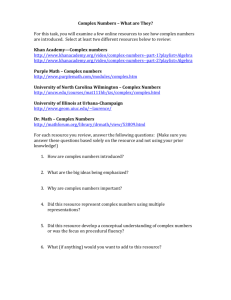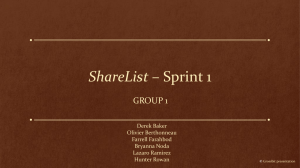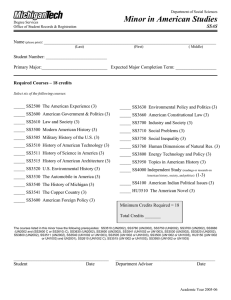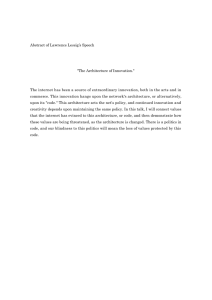AP United States Government & Politics Instructor Institute Overview
advertisement
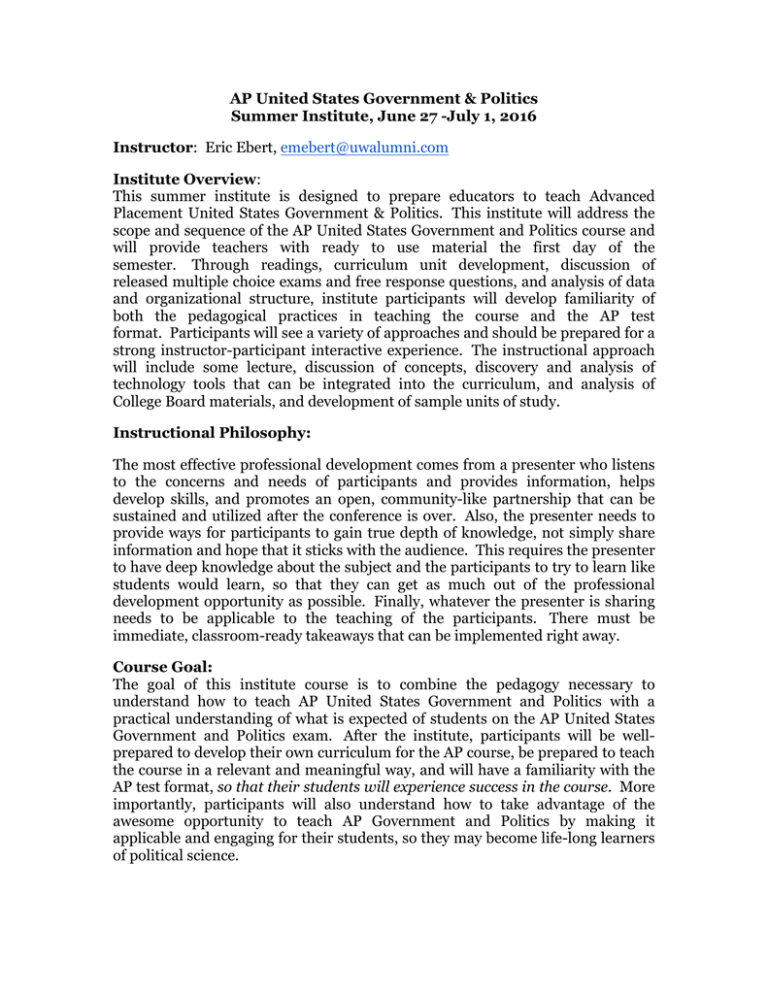
AP United States Government & Politics Summer Institute, June 27 -July 1, 2016 Instructor: Eric Ebert, emebert@uwalumni.com Institute Overview: This summer institute is designed to prepare educators to teach Advanced Placement United States Government & Politics. This institute will address the scope and sequence of the AP United States Government and Politics course and will provide teachers with ready to use material the first day of the semester. Through readings, curriculum unit development, discussion of released multiple choice exams and free response questions, and analysis of data and organizational structure, institute participants will develop familiarity of both the pedagogical practices in teaching the course and the AP test format. Participants will see a variety of approaches and should be prepared for a strong instructor-participant interactive experience. The instructional approach will include some lecture, discussion of concepts, discovery and analysis of technology tools that can be integrated into the curriculum, and analysis of College Board materials, and development of sample units of study. Instructional Philosophy: The most effective professional development comes from a presenter who listens to the concerns and needs of participants and provides information, helps develop skills, and promotes an open, community-like partnership that can be sustained and utilized after the conference is over. Also, the presenter needs to provide ways for participants to gain true depth of knowledge, not simply share information and hope that it sticks with the audience. This requires the presenter to have deep knowledge about the subject and the participants to try to learn like students would learn, so that they can get as much out of the professional development opportunity as possible. Finally, whatever the presenter is sharing needs to be applicable to the teaching of the participants. There must be immediate, classroom-ready takeaways that can be implemented right away. Course Goal: The goal of this institute course is to combine the pedagogy necessary to understand how to teach AP United States Government and Politics with a practical understanding of what is expected of students on the AP United States Government and Politics exam. After the institute, participants will be wellprepared to develop their own curriculum for the AP course, be prepared to teach the course in a relevant and meaningful way, and will have a familiarity with the AP test format, so that their students will experience success in the course. More importantly, participants will also understand how to take advantage of the awesome opportunity to teach AP Government and Politics by making it applicable and engaging for their students, so they may become life-long learners of political science. Course Objectives: 1. To increase participant knowledge in helping students gain and display an analytical understanding of the American political system in a fast-paced, rigorous environment. 2. To increase participant awareness of ways to create an open classroom environment that focuses on inclusiveness and equity when deciding what students can enroll in the course. 3. To increase participant understanding of the curricular framework of the AP United States Government and Politics course. 4. To increase participant knowledge and awareness of the various technology tools that can be integrated into the course curriculum. 5. To increase participant pedagogy involving the use of writing as a tool to increase comprehension of the concepts associated with AP United States Government and Politics. 6. To increase participant knowledge concerning the variety and desirability of texts, supplemental materials, and web resources available to enhance his or her course. 7. To increase participant knowledge of the nationally administered, comprehensive Advanced Placement exam and how best to prepare students to meet this challenge. Learner Objectives: After the course, each participant will: 1. Be able to develop a syllabus for a successful Advanced Placement course. 2. Develop an understanding of the six content areas that are covered in the course. 3. Be able to complete a unit plan in a day-to-day format that can be used in teaching the course and make decisions as to the materials that will best serve the needs of his or her students. 4. Be able to write and incorporate free response questions into their AP United States Government and Politics course. 5. Be able to develop strategies for using technology in the classroom to better meet the needs of a diverse group of learners in the AP United States Government and Politics course. 6. Be able to develop strategies to use in preparing students for the Advanced Placement exam. Required Readings: Selections from the following that will be provided at the beginning of the class: American Government, Wilson, DiIulio Government in America: People, Politics, and Policy, Lineberry, Edwards, Wattenberg Government by the People, Magleby, Light The Lanahan Readings in the American Polity, Ladd, Serow, eds. The Filter Bubble, Eli Pariser Presidential Character, James Barber Speech, Conduct, and The First Amendment, Howard Schweber, The Waxman Report, Henry Waxman Special Requirements: Each participant should provide his or her own laptop computer. The instructor will share resources and technology tips with participants. Also, the group will collaborate on a number of resources throughout the week. It is best if all have access to those resources during the conference, so please bring one with you. General Methodology: The format of this course will include lecture, discussion, integration of technology tools, individual evaluation of materials, presentations, readings, creation of personal free response questions and multiple choice exams, and viewing of pertinent websites and video clips that enhance the AP United States Government and Politics experience. AP Summer Institute Course Outline Note: Please be aware that there is room for flexibility to ensure that the personal goals, needs, and expectations of each participant are met. Monday Morning I. Introductions and Goal Setting II. Developing a Successful AP Program A. Philosophy and Purpose of AP B. Research Behind Use of AP C. Purpose of AP for Students D. Equity and Access in AP a. Who Gets In? a. College Board Equity Policy b. Who Takes the Exam? c. Student Recruitment i. Strategies for Recruitment ii. Use of the PLAN Test E. Summer Assignment and Welcome Letter F. College Board AP Resources a. AP Course Audit b. AP Central Readings c. AP Community d. AP Vertical Teaming G. Useful Websites to Expand Curriculum and Reading Choices H. Getting to Know College Board Documents a. Teacher’s Guide b. Course Description (Acorn Book) I. Curriculum Outline a. Time Consideration and Outline of Days b. Building a Calendar J. Textbook Options Afternoon I. Current Events Strategies II. Curriculum Focus: Constitutional Underpinnings A. Student Objectives B. Sample Lecture: Federalism C. Unit One Playlist* D. Unit One Resource Sharing Tuesday Morning I. Introduction to the AP Government Free Response Section (FRQ) A. Developing Strategies for Teaching the FRQ B. Developing Strategies for Answering the FRQ C. The AP Reading a. AP Reading Simulation b. Developing a Model for Free Response Creation c. Discussion of Past FRQs and Rubrics D. Creation of FRQs with rubrics to share II. Cartoons and Non-Linguistic Data A. Chart Analysis Activity Afternoon I. Curriculum Focus: Political Beliefs and Behaviors A. Student Objectives B. Unit Two Playlist C. Socratic Seminar: The Filter Bubble D. Unit Two Resource Sharing II. Vocabulary . Important Vocab Activities Wednesday Morning I. Analysis of Released Practice Exams A. AP Score Breakdown B. How to Score the AP Exam II. Multiple Choice Questions A. Multiple Choice Test Taking Strategies B. Sample AP Multiple Choice Exam and Score C. Breakdown of released exam questions and topics a. Analysis of the MCQ Buzz Words D. Strategies for Creating AP Exam Multiple Choice Questions Afternoon I. Curriculum Focus: Political Parties, Elections, Media, and Interest Groups A. Student Objectives B. Sample Lecture: Campaign Finance C. Unit Three Playlist D. Electoral College SAC II. Curriculum Focus: The Institutions A. Student Objectives B. Congress Playlist C. FRQ Creation Thursday Morning I. Curriculum Focus: The Institutions, Cont A. POTUS Playlist B. Congress vs. Presidency FRQ creation C. Sample Lecture: The Bureaucracy D. Bureaucracy Playlist E. Judiciary Playlist F. Unit Four Resource Sharing Afternoon I. Curriculum Focus: Civil Liberties and Civil Rights A. The Great Civil Liberties Court Case Tournament B. Reading Discussion: “The December Dilemma:” Public Displays and the First Amendment C. Civil Liberties and Civil Rights Playlist Friday Morning I. Curriculum Focus: The Policy Making Process A. Policy Playlist and Sample Lecture a. Personalized Public Policy b. The Federal Budget Challenge II. Preparing for the AP Exam: May, 2017 A. Test Prep Strategies and Resources B. Test Prep Playlist C. Test Prep Resource Sharing III. After the AP Exam Project Ideas IV. Sharing of Professional Development Opportunities V. Conclusion . Final Questions or Comments A. Further Communication B. Evaluations *A playlist includes all of those “can’t miss” strategies and lessons from each unit, the most popular activities that work best with my students that help successfully drive understanding of key course concepts. I look forward to a great week of learning together! Please feel free to email me at emebert@uwalumni.com with any questions regarding information distributed or the content and structure of this APSI course.
